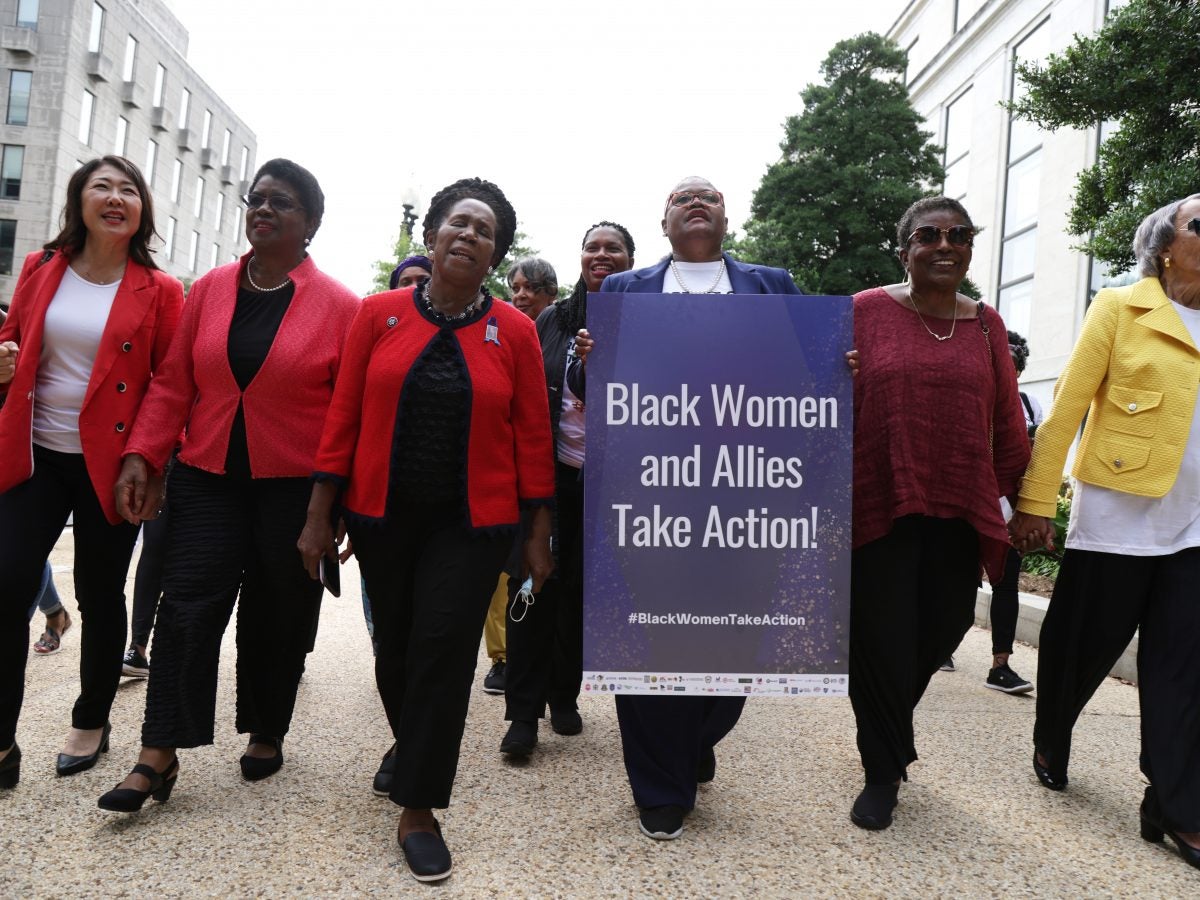
Leaders of national organizations that serve Black women, activists, and allies have planned a new round of peaceful actions this week to build urgency around existing calls for Congress to pass comprehensive voting rights legislation.
“There is a direct line between the protection of our voting rights and delivering on the policies that benefit millions of women and people of color,” said Melanie Campbell, President/CEO of the National Coalition of Black Civic Participation and convener of its Black Women’s Roundtable.
The push comes after a Republican-led filibuster in the Senate last week crushed debate on voting rights legislation for a third time. Last Wednesday, Senate Republicans unanimously voted against opening debate on the Freedom to Vote Act. The For the People Act also previously stalled in the Senate. The John Lewis Voting Rights Advancement Act–introduced by Rep. Terri Sewell (D-AL)– passed the House, but a Senate bill awaits further action.
Senate Majority Leader Chuck Schumer now says he intends to bring the John Lewis Voting Rights Advancement Act to the Senate floor as soon as this week.
“… Despite Republican opposition, the fight to protect our democracy is far from over in the United States Senate,” said Schumer. “Voting rights are too precious, too fundamental to abandon because of obstruction from the minority.”
He added that the Voting Rights Act has historically been bipartisan. “But following the gutting of the law by recent Supreme Court rulings, the Voting Rights Act needs to be restored and the Senate ought to, at a minimum, be permitted to debate it.”
This week, the National Council of Negro Women and NCBCP’s Black Women’s Roundtable will partner with other national civil rights, labor, faith, women’s rights and economic and social justice organizations to host what’s being called “Black Women Leaders and Allies Take Action.”
The event on Tuesday, October 26 is being billed as a national call-in day asking constituents to contact their Senators about voting rights and topics such as the Biden-Harris Administration’s pending infrastructure package.
On Thursday, October 28 the week of action will culminate in a “freedom walk” starting at 1:30 p.m. at the D.C. headquarters of the National Council of Negro Women to the U.S. Senate building.
“Voting rights guarantee all of the other rights we hold as citizens,” said Janice L. Mathis, Executive Director, National Council on Negro Women. “Black women must seize this moment to preserve democracy and protect our families, communities and the nation from voter suppression.”
This week’s actions follow a three-day, 70-mile “Freedom to Vote” relay from West Virginia to Washington, D.C. last Thursday to urge lawmakers to pass federal voting rights legislation.
Black Voters Matter co-founders LaTosha Brown and Cliff Albright and Martin Luther King III, chairman of the board at Drum Majors for Change, joined forces with local officials, organizers, and community members.
People walked, ran, and cycled to the U.S. Capitol Building in D.C., making stops in Harpers Ferry in W.V and Points of Rocks and Glen Echo Park in Maryland. The route was meant to trace the nation’s struggle for freedom.
Among the advocacy groups supporting the event were Public Citizen, the League of Conservation Voters, D.C. Vote, the League of Women Voters, Declaration for American Democracy, and the Georgia Coalition for the People’s Agenda.
Meanwhile, President Joe Biden and Vice President Kamala Harris have both spoken out about voting rights in recent days.
Both attended the 10th anniversary celebration of the dedication of the Dr. Martin Luther King Jr. Memorial in the nation’s capital. Family of the late Dr. King and Coretta Scott King attended, as did House Speaker Nancy Pelosi, and members of the Congressional Black Caucus (CBC).
“We must defend and strengthen the right that unlocks all other rights: the right to vote,” said VP Harris to applause.
“And as we all know, in 2013, the Voting Rights Act that Dr. King and so many others fought for was gutted by the Supreme Court decision in Shelby v. Holder. That decision opened the floodgates for the anti-voter laws we see being passed in states throughout our country today,” she said. “And to be sure, we should not have to keep fighting so hard to secure our fundamental rights. But fight we must, and fight we will.”
Campbell agreed. She said the window to pass critical pieces of voting legislation is closing and Congress must act now before it is too late. She also urged Congress to pass the Biden-Harris Administration’s Build Back Better and Infrastructure Investment and Jobs bills, which are currently pending in both chambers.
These measures disproportionately impact communities of color, Campbell noted.
“The power of Black women voters and others is what shifted power in the halls of Congress and the White House,” she said. “Black women and our allies are demanding that their leaders deliver on those promises. Voting rights are non-negotiable. Economic justice is a priority. We will keep fighting for both because the two are inextricably linked.”